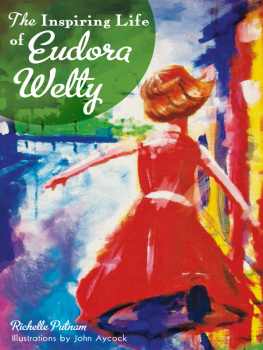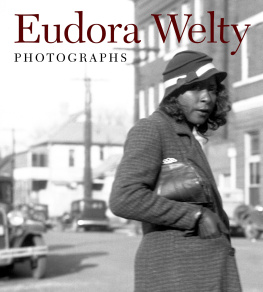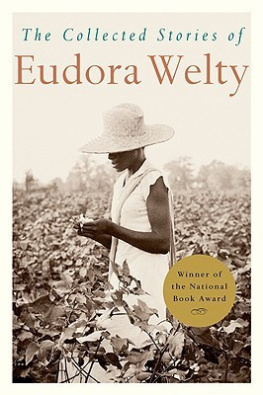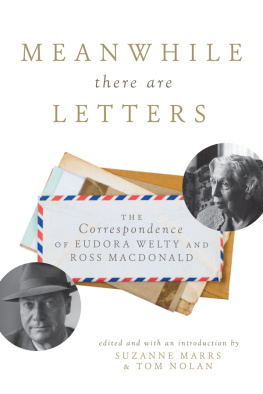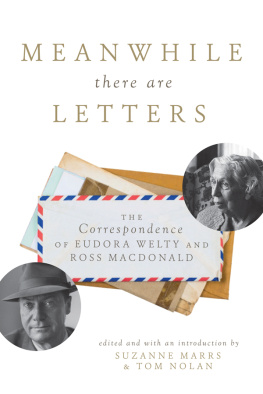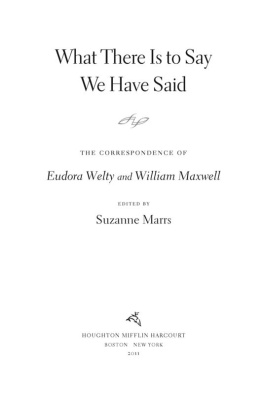
Published by The History Press
Charleston, SC 29403
www.historypress.net
Copyright 2014 by Richelle Putnam
All rights reserved
Cover art by John Aycock
First published 2014
e-book edition 2014
ISBN 978.1.62584.070.7
Library of Congress Cataloging-in-Publication Data
Putnam, Richelle, author.
The Inspiring Life of Eudora Welty : a Mississippi Legend / Richelle Putnam.
pages cm
Includes bibliographical references.
print edition ISBN 978-1-62619-000-9 (hardback)
1. Welty, Eudora, 1909-2001. 2. Authors, American--20th century--Biography--Juvenile literature. 3. Mississippi--Biography. 4. Mississippi--Juvenile literature. I. Title.
PS3545.E6Z847 2014
813.52--dc23
[B]
2013047714
Notice: The information in this book is true and complete to the best of our knowledge. It is offered without guarantee on the part of the author or The History Press. The author and The History Press disclaim all liability in connection with the use of this book.
All rights reserved. No part of this book may be reproduced or transmitted in any form whatsoever without prior written permission from the publisher except in the case of brief quotations embodied in critical articles and reviews.
Contents
Introduction
Eudora Welty never strayed from her childhood dream of one day becoming an author. By the age of ten, she was a published writer, and her writing and artwork had won national awards. From there, her writing life took her through war, a depression, the civil rights movement and the deaths of her parents and siblings. Known all over the world as one of Americas most important writers, Eudora Weltys roots remained firmly planted at her childhood home of Jackson, Mississippi, where she did what she loved doing mostwrote stories.
Prologue
Rain fell steadily in Jackson the last week of April 1973, threatening to spoil the annual Mississippi Arts Festival. The festival celebrated artists from all over the state. This year, its special honoree was Eudora Welty, and May 2 would become Eudora Welty Day. One thousand members throughout Mississippi made up the committee whose mission was to honor and commemorate Eudoras accomplishments.
At the end of February, Eudora had returned to Jackson from Mobile with writer friend Reynolds Price. The two writers met in the early spring of 1955. Eudoras train arrived about two oclock in the morning at the railroad station in Durham, North Carolina. She would speak to the students at Duke that day. Eudora insisted that no one meet her at the station at such an atrocious hour. She could manage getting herself and her bags to her hotel. However, Eudora was the only passenger to step off the train at an unlit, deserted station. Standing alone in the darkness in a strange place, she noticed a lone figure emerge. It came toward her.
Im Reynolds Price, a student at Duke, the figure said. He had waited for her train, knowing her destined plight.
She stayed in Durham three days while giving her lecture, Place in Fiction, at the Womans College at Duke. During her time there, Eudora read the only serious short story Reynolds had ever written. Then she asked him, May I show this to my agent? Reynolds was a twenty-two-year-old novice writer. Eudora was a forty-five-year-old master of words. They became lifelong friends. He would be one of many.
Upon her return to Jackson from Mobile with Reynolds, Eudora focused on the coming festival and working with the committee. As much as everyone looked forward to the festival, Jackson was an unsettled environment. Sadly, the 1960s had left Eudora heartbroken. Her mother died on January 20, 1966. Four days later, her brother Edward died from a brain infection. Her other brother, Walter, passed away in January 1959. Eudoras only family left was Walters wife, Mittie, and their two daughters, Elizabeth and Mary Alice.
With the turbulent 1960s came the demand for equal rights throughout the country. Malcolm X advocated black power. Martin Luther King Jr. dreamed that one dayformer slaves and the sons of former slave owners will be able to sit down together at the table of brotherhood. Even so, Jim Crow remained the law in the South. Despite the Supreme Courts 1954 ruling, the South continued to resist school desegregation. Restaurants like Woolworths five-and-dime refused to serve blacks at the whites-only counters. In December 1960, the Supreme Court declared segregation illegal. When the Kennedy administration failed to enforce the law, interracial groups of Freedom Riders traveled on buses across the South. This action forced the federal government to step in.
In 1962, after much violent opposition by whites, the all-white University of Mississippi finally enrolled James Meredith, who had been refused admission three times. Alabama made the nations headlines with its Childrens Crusade in Birmingham, labeled the worst big city in the U.S.A. On September 15, 1963, a member of the Ku Klux Klan set off a bomb at the African American Sixteenth Street Baptist Church in Birmingham. The bomb killed four young girls and injured twenty-two others. In November, in Dallas, Texas, Lee Harvey Oswald assassinated President John F. Kennedy. Ninety-nine minutes later, Vice President Lyndon Baines Johnson took the oath for the presidency on Air Force One.
On June 12, 1963, Byron de la Beckwith shot Medgar Evers, field secretary for the National Association for the Advancement of Colored People, outside his home in Jackson, Mississippi. Angered by the news, Eudora wrote a story about the murder titled Where Is the Voice Coming From. She sent it to William Maxwell, editor at the New Yorker. He immediately bought it and rushed it into print. When authorities arrested Beckwith for the murder, too many of Eudoras details about the murder were accurate. To avoid a libel suit, Eudora and the editors changed details of the story over the telephone.
All-white Millsaps College closed its public events to African Americans in 1958. The college also discouraged its professors from speaking at Tougaloo College, the private, historically black college founded by the American Missionary Association in 1869 in Jackson. However, Eudora and friend Jane Reid Petty could not be hindered. They and others continued to carpool to Tougaloo. Often, they changed vehicles so the sheriffs department wouldnt notice a pattern in their visits and try to stop them.
On April 2, 1963, Millsaps turned away a Tougaloo professor and several students trying to attend a play on the colleges campus. Sixteen days later, Eudora Welty gave her address at the Southern Literary Festival, hosted that year by Millsaps College, to an integrated audience, which she requested. After her lecture on Words into Fiction, she read her story Powerhouse, about an African American pianist and his band playing at a segregated dance. She made her point.
During the Freedom Summer of 64 in Mississippi, three civil rights workersMickey Schwerner, James Chaney and Andrew Goodmandeparted Meridian. They traveled to Philadelphia, Mississippi, to check on the black church that the Klan had burned. In Neshoba County, Mississippi, Klansmen ambushed and murdered the three workers. Twenty-one men were accused of the crime. Eighteen were tried. None were convicted of murder. Years later, in 2005, Edgar Ray Killen, a Baptist preacher in Philadelphia, Mississippi, was tried for three counts of murder. He was found guilty on three counts of manslaughter. No one has ever been found guilty of murder in this case.
Congress passed the Civil Rights Act of 1964 prohibiting discrimination based on race in employment, public accommodations, publicly owned facilities, union membership and federally funded programs. In 1967, the Supreme Court ruled that state laws against interracial marriage (called miscegenation) were unconstitutional. President Johnson signed the Civil Rights Act of 1968. That same year, Martin Luther King Jr. and New York senator Robert F. Kennedy were assassinated.
Next page
